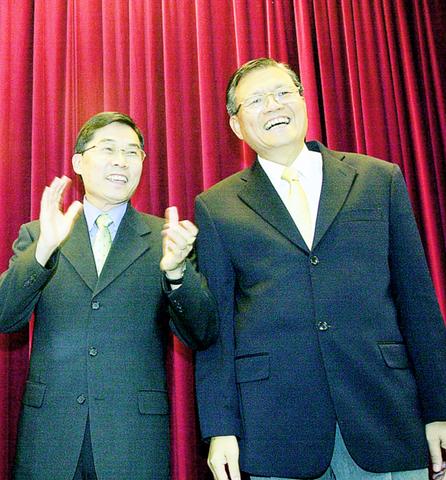Despite being able to make the KMT feel proud about losing last December's Kaohsiung mayoral election, KMT Legislator James Chen (
Chen tendered his resignation after blue-camp councilors voted scandal-ridden independent councilor Chu An-hsiung (

TAIPEI TIMES FILE PHOTO
"I offered to resign because, as the head of the party's Organization and Development Committee, I need to take responsibility for problems that damaged the image of the party," Chen said.
Despite his notorious reputation, Chu won the speakership with 25 votes. It is believed 11 of 12 KMT councilors, six out of seven PFP councilors and eight out of nine independents voted for Chu.
Prosecutors have confirmed that several Kaohsiung city councilors have turned themselves in and admitted to receiving bribes from Chu.
Chen said he is sorry to see such an outcome, adding that he failed to carry through the party headquarters' order that KMT councilors not vote for Chu.
"The job of the Organization and Development Committee is to take charge of all issues relating to the party's electoral campaign," Chen said. "I ought to take on all responsibility for any unfavorable and undesirable electoral outcome or mistakes resulting from [the committee's] campaign strategies."
KMT Secretary-General Lin Fong-cheng (
Saying that James Chen's resignation was a natural way to demonstrate his responsibility, KMT Legislator Apollo Chen (
"Aside from being in charge of the party's electoral campaign work, another job of the committee is to recruit new members to the party," Apollo Chen said. "I think it would help the party if the head of the committee had a clean image and didn't remind the public of the KMT's old unpleasant image."
While lauding James Chen's rich campaign experience, Apollo Chen said that such a background can sometimes work against the head of the Organization and Development Committee.
"Given James Chen's decades-long career as a public servant, he has come to learn a lot about under-the-table deals, which then remind the public of the KMT's old unpleasant image," Apollo Chen said.
James Chen is a legislator-at-large and was also a Taipei City councilor for 29 years, during which he served as city council speaker and vice speaker.
James Chen was well-known for his attacks on Chen Shui-bian (
James Chen had also served as the director of Lien's Taipei campaign office when Lien was running in the 2000 presidential election.
In the Kaohsiung mayoral race, Chen insisted on supporting the KMT's Huang Jun-ying (黃俊英), despite the party's plan to dump Huang in favor of independent Chang Po-ya (張博雅). The party decided to stick with Huang and, despite losing to the race to the DPP's Frank Hsieh (謝長廷), felt proud of the result.
Huang, secured 47 percent of the vote, while Hsieh won 50 percent.
Chen said that it was for the sake of the KMT that he accepted the job as head of the Organization and Development Committee.
He said his resignation stems from that same concern.
"If my resignation can increase KMT party members' trust in the party, then I believe my resignation is in some way a contribution to the party as well," Chen said.
Chen remains a member of the party's Central Standing Committee, its highest decision-making body.

Chinese Nationalist Party (KMT) Chairman Eric Chu (朱立倫), spokeswoman Yang Chih-yu (楊智伃) and Legislator Hsieh Lung-chieh (謝龍介) would be summoned by police for questioning for leading an illegal assembly on Thursday evening last week, Minister of the Interior Liu Shyh-fang (劉世芳) said today. The three KMT officials led an assembly outside the Taipei City Prosecutors’ Office, a restricted area where public assembly is not allowed, protesting the questioning of several KMT staff and searches of KMT headquarters and offices in a recall petition forgery case. Chu, Yang and Hsieh are all suspected of contravening the Assembly and Parade Act (集會遊行法) by holding

PRAISE: Japanese visitor Takashi Kubota said the Taiwanese temple architecture images showcased in the AI Art Gallery were the most impressive displays he saw Taiwan does not have an official pavilion at the World Expo in Osaka, Japan, because of its diplomatic predicament, but the government-backed Tech World pavilion is drawing interest with its unique recreations of works by Taiwanese artists. The pavilion features an artificial intelligence (AI)-based art gallery showcasing works of famous Taiwanese artists from the Japanese colonial period using innovative technologies. Among its main simulated displays are Eastern gouache paintings by Chen Chin (陳進), Lin Yu-shan (林玉山) and Kuo Hsueh-hu (郭雪湖), who were the three young Taiwanese painters selected for the East Asian Painting exhibition in 1927. Gouache is a water-based

Taiwan would welcome the return of Honduras as a diplomatic ally if its next president decides to make such a move, Minister of Foreign Affairs Lin Chia-lung (林佳龍) said yesterday. “Of course, we would welcome Honduras if they want to restore diplomatic ties with Taiwan after their elections,” Lin said at a meeting of the legislature’s Foreign Affairs and National Defense Committee, when asked to comment on statements made by two of the three Honduran presidential candidates during the presidential campaign in the Central American country. Taiwan is paying close attention to the region as a whole in the wake of a

OFF-TARGET: More than 30,000 participants were expected to take part in the Games next month, but only 6,550 foreign and 19,400 Taiwanese athletes have registered Taipei city councilors yesterday blasted the organizers of next month’s World Masters Games over sudden timetable and venue changes, which they said have caused thousands of participants to back out of the international sporting event, among other organizational issues. They also cited visa delays and political interference by China as reasons many foreign athletes are requesting refunds for the event, to be held from May 17 to 30. Jointly organized by the Taipei and New Taipei City governments, the games have been rocked by numerous controversies since preparations began in 2020. Taipei City Councilor Lin Yen-feng (林延鳳) said yesterday that new measures by